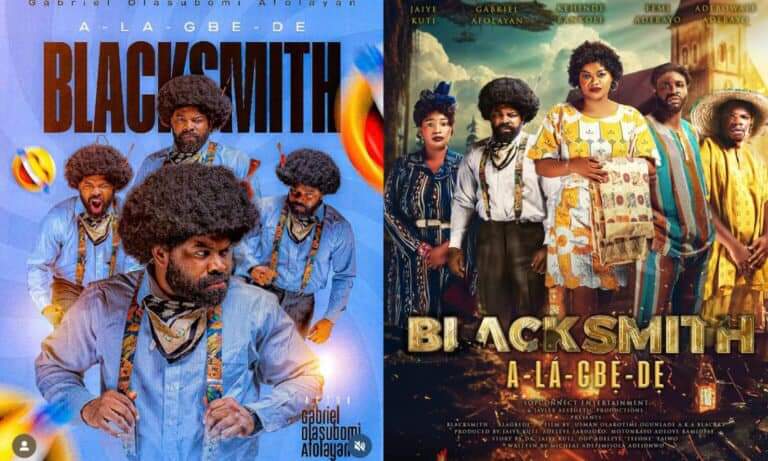Movie review: Blacksmith (Alagbede) is a stereotypical Nollywood story but funny with good acting
Blacksmith (Alagbede) is a Yoruba movie you will enjoy even though it might not have any hook on you afterwards. The movie, currently showing in cinemas, is a mix of romance, comedy and drama. Directed by Usman ‘Blackky’ Ogunlade and produced by Motunrayo Adeoye and Jaiye Kuti, the film is packed with good acting and nothing more than needed.

Blacksmith (Alagbede) tells the story of a blacksmith named Adio (Femi Adebayo) and his sweetheart from a well-to-do-home, Omolewa (Kehinde Bankole). As a poor young chap, Adio was left with no choice but to struggle to measure up to the standard demanded by Omolewa ‘s mother (Bimbo Oshin), who was ready to give her daughter’s hand in marriage to a rich guy. Backed by his friend Wole (Gbenga Afolayan), Adio decided to get wealth through money rituals. This led to a lack of peace of mind, and wealth became undesirable to him.
Firstly, the romantic part of this movie is more like a remix of the stereotypical Nollywood movies of the 90s and early 2000s, where a broke boy with no future ambition will have the beautiful daughter of a wealthy man in love with him. However, I like that the writers plotted the romance to lead to money rituals and spiced the movie with light comedy. Even during serious scenes, many others and I, viewing the movie at the cinema, couldn’t help but laugh out loud.
Like I said earlier, the acting in this movie is really good and deserves 8/10. The part that made me believe I was in for a good movie was the scene involving the first babalawo (witch doctor) played by Adewale Alebiosu. That part was barely up to three minutes long, but the man killed it. While addressing Adio and Wole, the look on his face, despite how serious it was, flowed freely with the comedic vibe associated with the scene. Femi Adebayo and Gbenga Afolayan also matched him with their A-game. Other actors in the movie include Jide Kosoko, Mr Macaroni, Elesho, Jaiye Kuti, Fathia Balogun, etc.
Another thing that blew me away about the Babalawo scene was the lighting, which was cinematic. The lighting department did well in the night scenes by not only providing light for the faces of the characters but also for the environment, which was an open space. This was also done for the night bathroom scene, where a white light blasted behind the trees to mimic moonlight. So far, the all-night scenes of this movie get 8/10 from me. If I’m thinking of making a film today, the guys behind this movie’s lighting and colour grading will get a call from me.
Blacksmith (Alagbede) mimicked the 1970s Nigeria as seen in the costumes. Some of the actors rocked afros and fashion from that time. Even the architectural style and cars were from that period. I don’t know if those who don’t understand Yoruba will enjoy the movie because I didn’t notice the subtitles. I also can’t predict if the movie will perform well in cinemas. However, I strongly believe this movie will do well on streaming platforms, to the point of trending on X’s social media platform. Blacksmith (Alagbede) gets 7/10.




